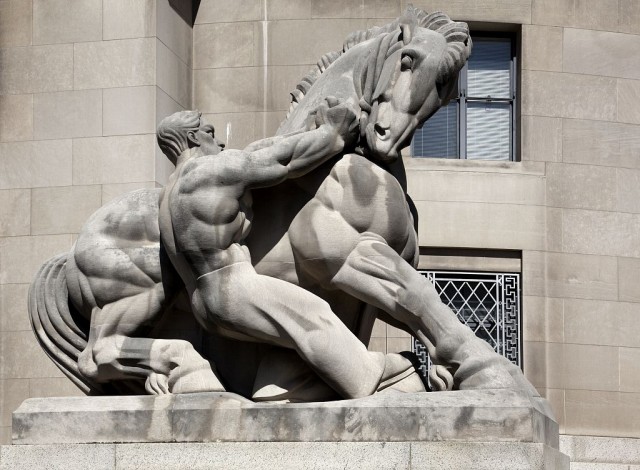Feds may use subpoena powers to study patent trolls
FTC can crack open secret patent deals to learn about a shadowy business.

"Man Controlling Trade" (1942) by Michael Lantz. Statue outside Federal Trade Commission.
In the past week, it's become clearer than ever that government interest in the issue is growing, not fading. Two key FTC directors revealed at a legal conference last week that they're in favor of opening up a so-called 6(b) investigation about whether or not patent trolls, which the FTC calls "patent assertion entities," are stifling competition. That would allow the FTC to use its subpoena powers to collect information that's not available to academics, journalists, and others who write about patent troll activities.
For instance, once such an investigation is underway, the FTC would be able to get the details of confidential litigation settlements made with trolls both large and small. It could find out when trolls are splitting their revenues with operating companies or larger aggregators like Intellectual Ventures. It could find out how much money really goes back to inventors. That is an important issue, since many patent-assertion entities claim their business model is justified because they help the "individual inventor" get fair payment for their ideas.
Just moving ahead with such a study would be a victory for the groups, including tech companies, that are asking for more government scrutiny of the patent troll issue. In comments [PDF] submitted jointly by Google, Earthlink, Red Hat, and Blackberry, the companies specifically requested such a study; in particular, to investigate the prevalence of "outsourcing" patent attacks by operating companies. The Computer and Communications Industry Association [Comments, PDF] and the National Restaurant Association [Comments, PDF] also asked for such scrutiny.
"The biggest problem with the troll issue is the lack of information," said David Balto, a former FTC policy director who now has a private antitrust practice. "Through the 6(b) power, they can figure out the relationship between the patent trolls, and the firms they're acquiring patents from."
Balto submitted comments to the FTC on behalf of the restaurant group and the Food Marketing Institute. It's telling that such groups felt compelled to comment on this issue at all, and it suggests the economy-wide scope of the patent troll problem. The National Restaurant Association comments suggest that the FTC use its powers to conduct a 6(b) study focused on:
- The full ownership interest of PAEs and a list of all subsidiaries and affiliates;
- What are the relations between PAEs and the owners of the patents and how do the owners benefit from patent enforcement;
- What are the type and scope of demand letters used by PAEs;
- How often is litigation by PAEs successful; at what stage is litigation typically resolved;
- How are patents acquired by PAEs and from whom; what is the purpose of these transactions; and
- How does the PAE determine which patents to acquire.
Having said that, much of the information listed above really should be public. Patents are monopolies granted by a government agency that should represent citizens first and foremost; courts have long been too obliging about allowing both PAEs and operating companies to keep information secret about patent assertion. Patent owners are fond of using metaphors about owning land when they want to win a lawsuit, but have strongly resisted providing the kind of disclosure available to the public in real-estate records.
The news was first reported (subscription only) in Global Competition Review, a journal covering antitrust and competition law. The directors who said they favor conducting the study are Howard Shelanski, who directs the FTC bureau of economics; and Richard Feinstein, who directs the bureau of competition.



No comments:
Post a Comment